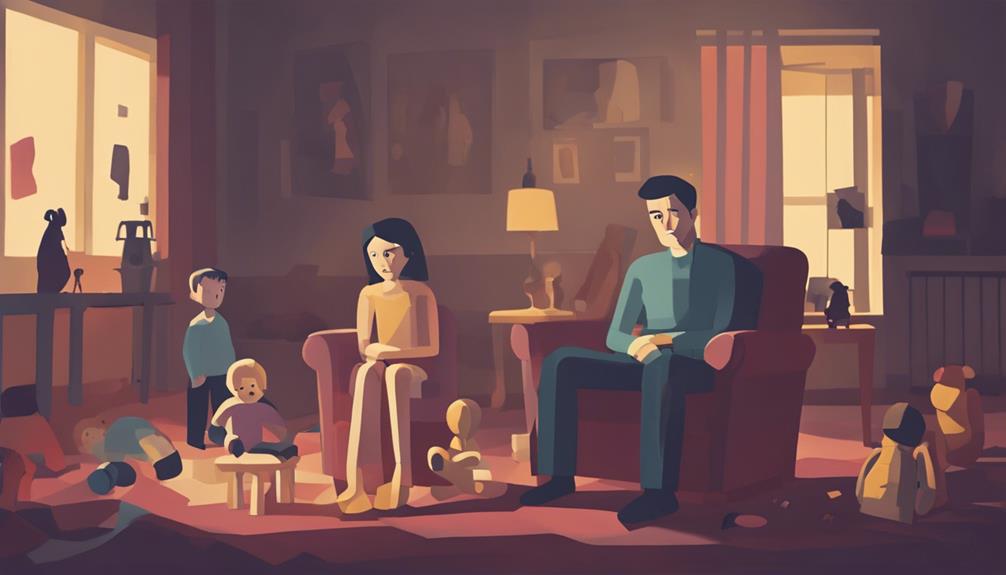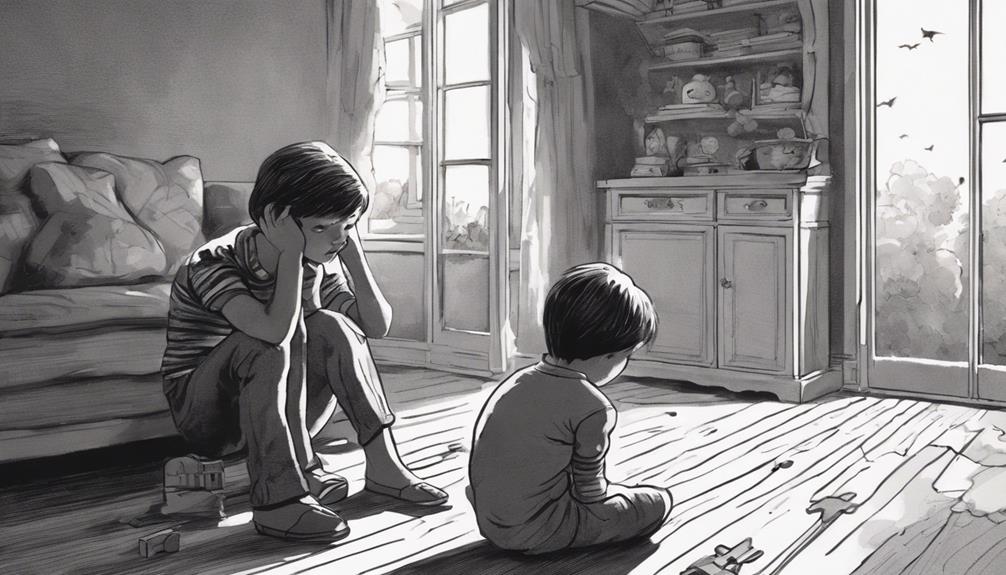Understanding societal views on infidelity reveals its profound impact on family dynamics. When infidelity occurs, it doesn't just affect the couple; it reverberates through the entire family, leading to emotional distress and breakdowns in communication. Stigmas surrounding infidelity can foster feelings of shame and isolation, complicating recovery for everyone involved. Children often feel confused and insecure, which can manifest as behavioral changes. As families navigate their new realities, effective coping mechanisms, like open communication and therapy, play a vital role. By exploring these societal perceptions, you'll gain deeper insights into the complexities of this issue.
Definition of Infidelity

Infidelity, often defined as a breach of trust within a committed relationship, typically involves emotional or physical involvement with someone outside the partnership. This breach can manifest in various forms, including emotional betrayal, where one partner forms a deep emotional connection with another individual, undermining the original relationship's intimacy. Emotional infidelity often blurs relationship boundaries, leading to confusion and distress.
When you consider infidelity, it's vital to recognize that each relationship establishes its own boundaries. These boundaries define acceptable behavior and help maintain trust and security. When one partner crosses these lines, it doesn't just harm the bond between partners; it affects the entire family unit. The fallout from infidelity can lead to feelings of betrayal, anger, and confusion, not just for the partners involved but also for any children or extended family members.
Empirical studies suggest that infidelity is often a symptom of deeper issues within a relationship, such as unmet needs or dissatisfaction. Understanding the nuances of infidelity can illuminate the complexities of trust and commitment, highlighting the importance of maintaining clear relationship boundaries to prevent emotional betrayal and its subsequent impact on family dynamics.
Historical Perspectives on Infidelity
Throughout history, societies have grappled with the concept of infidelity, shaping its perception and consequences based on cultural, legal, and moral frameworks.
In ancient civilizations, such as Mesopotamia and Greece, cultural attitudes towards infidelity varied widely. While some cultures tolerated extramarital relationships, others viewed them as a severe breach of trust. Legal implications often reflected these attitudes; for instance, in some societies, adultery could lead to severe penalties, including public shaming or even capital punishment.
The Middle Ages saw the intertwining of infidelity with religious doctrine, further complicating its perception. The Church condemned adultery, reinforcing the idea that it undermined the sanctity of marriage. During this time, legal repercussions for infidelity often involved ecclesiastical courts, which imposed penalties based on moral rather than civil law.
In modern times, cultural attitudes have shifted considerably. While infidelity is still viewed negatively in many societies, the legal implications have become less severe, often relegated to civil matters such as divorce proceedings. This evolution reflects broader societal changes, including the rise of individualism and changing views on marriage and fidelity, highlighting how historical contexts continue to influence contemporary perspectives on infidelity.
Psychological Effects on Families

The psychological effects of infidelity on families can be profound, often leading to a cascade of emotional distress that impacts all members, regardless of their direct involvement in the betrayal. You might notice that emotional trauma manifests in various ways, including anxiety, depression, and feelings of betrayal.
Family dynamics can shift dramatically; trust fractures, and communication often breaks down, creating an environment filled with tension and uncertainty.
Children, in particular, may struggle to understand the complexities of adult relationships, leading to confusion and feelings of insecurity. They might also internalize the conflict, which can impact their mental health and future relationship patterns.
As a family member grapples with the emotional fallout, you'll find that the atmosphere at home can become charged with resentment, anger, or sadness, making it difficult for any member to express their feelings openly.
Moreover, the infidelity could lead to a reevaluation of roles within the family, as members might take on responsibilities or emotional burdens that they weren't prepared for.
Social Stigma Surrounding Infidelity
Facing social stigma, individuals involved in infidelity often encounter judgment and isolation, which can exacerbate their emotional struggle and hinder the healing process. Cultural perceptions greatly shape how society views infidelity, framing it as a moral failing rather than a complex human experience. This negative lens can lead to harsh scrutiny, making individuals feel ashamed and reluctant to seek support.
The moral implications of infidelity are deeply ingrained in many cultures, often linked to values such as loyalty and commitment. When you or someone you know experiences infidelity, the resulting stigma may not only affect the individuals involved but also extend to families and friends. This social backlash can create an environment where open dialogue is stifled, preventing constructive conversations about relationship dynamics.
As a result, individuals may face feelings of loneliness, guilt, and anxiety, complicating their ability to process the situation. The stigma surrounding infidelity serves to reinforce harmful stereotypes while discouraging empathy and understanding. Consequently, addressing these cultural perceptions and moral implications is vital for fostering a more supportive environment for those affected by infidelity.
Children's Response to Infidelity

Children often grapple with the emotional fallout of infidelity, experiencing confusion, anger, and a profound sense of loss that can disrupt their sense of security and trust within the family unit.
Research indicates that children often exhibit significant changes in behavior in response to their parents' infidelity. These changes can manifest as withdrawal, aggression, or a decline in academic performance.
Emotional responses vary widely; some children may internalize their feelings, displaying symptoms of anxiety or depression, while others might externalize their distress through acting out. The age and developmental stage of the child can greatly influence how they process these emotions.
Younger children may struggle to understand the situation, leading to feelings of abandonment or guilt, while adolescents may express their turmoil through rebellion or distancing themselves from family dynamics.
Understanding how infidelity impacts children requires acknowledging the complexity of their emotional landscape. Their responses aren't merely reactions to the infidelity itself but are also influenced by the family's overall communication and coping strategies.
These factors ultimately shape the long-term emotional health and relational stability of the child within the family structure.
Coping Mechanisms for Families
Steering through the aftermath of infidelity requires families to adopt effective coping mechanisms that foster open communication and emotional support among all members. Establishing robust communication strategies is fundamental. Families should create a safe space where individuals can express their feelings without fear of judgment. This encourages honesty and helps each member articulate their pain, confusion, and expectations.
Additionally, emotional support plays a significant role in the healing process. It's essential for family members to validate each other's feelings, acknowledging that infidelity affects everyone differently. Engaging in family therapy can provide a structured environment for addressing complex emotions and improving interpersonal dynamics.
Moreover, setting aside regular family meetings can help maintain ongoing dialogue about the situation. This proactive approach allows everyone to share updates on their emotional state and discuss coping techniques that work for them.
Lastly, practicing empathy and patience is imperative. Recognizing that healing takes time can help family members navigate their emotions more effectively. By prioritizing communication strategies and emotional support, families can begin to cope with the impact of infidelity, laying the groundwork for future discussions and deeper understanding.
Healing and Rebuilding Trust

Rebuilding trust after infidelity demands a systematic approach that focuses on transparency, accountability, and consistent efforts from all family members.
To initiate this process, effective communication strategies are essential. Both partners need to express their feelings openly while also listening to each other without judgment. This not only clarifies misunderstandings but also fosters a safe environment for discussing difficult emotions.
You should also establish specific guidelines for accountability. This could include regular check-ins where both partners assess their emotional states and commitments. These sessions can help guarantee that both parties feel heard and validated, which is critical for the healing process.
Rebuilding intimacy is another important aspect. This doesn't only pertain to physical closeness but also emotional connection. Activities that promote bonding, such as date nights or shared hobbies, can greatly aid in this effort. By prioritizing time together, you create opportunities to reconnect and restore your relationship.
Ultimately, healing from infidelity is a gradual process that requires patience and dedication. With persistent efforts in communication and intimacy, trust can eventually be rebuilt, allowing the family to move forward stronger than before.
Conclusion
In understanding societal views on infidelity's impact on family, it's clear that the ramifications extend beyond the couple involved.
Infidelity can lead to psychological distress, social stigma, and complex responses from children.
While coping mechanisms vary, families often face the challenge of healing and rebuilding trust.
By recognizing these dynamics, you can foster a more empathetic dialogue around infidelity, ultimately aiding in the recovery process for those affected.
It's a nuanced issue that merits thoughtful consideration.
